Watching Yojouhan Shinwa Taikei is like watching a very complex engine; there's the constant thrum as it operates - provided here by Shintaro Asanuma's staccato voice - the complex mechanisms all operating together in order to drive... something. In the first three episodes the series doesn't reveal what it is attempting to convey or even how it intends to fill the remainder of its eleven episode run, there is only the core situation, continuously augmented, with the nameless protagonist at the centre. Bolstering this Groundhog Day-esque scenario is an impossibly trendy production from Madhouse that sports a gung-ho, raucous animation style and an opening backed by Asian Kung-fu Generation. There is an infectious, breathless enthusiasm to the opening episodes but whether this will be maintained and the final twist worthwhile, will make or break the series.
The opening days of a university education are filled with promise, especially the decision on which club to join to best spend time in between lectures. The protagonist opts first for the tennis club but discovers too late the skills required to make friends and, crucially, woo partners of the opposite sex. Instead he throws his lot in with Ozu, a snide and vindictive young man with a face only a mother could love and a penchant for causing brainless mischief wherever he goes. Complicating this mix is Akashi, a cantankerous and forthright girl who seems to take a special interest in the protagonist, much to his delight. When his tennis club adventures end with him being thrown into a raging river, time reverses and he is given another chance at a club, this time choosing the film club. Events end badly once again, as too does the cycling circle; it seems that the protagonist is tied to Ozu with the "black thread of fate", or perhaps the local deity or suspect fortune teller have something to do with his continuing mishaps.
The first three episodes of the series owe a lot to the early episodes of Sayonara Zetsubou Sensei for their tone and delivery, the familiar drawls of Hiroshi Kamiya may be absent but the ferocious indictment of modern society isn't. The protagonist is an outsider by nature and desperately wants to be part of any social circle, be that amateur film makers or cycle enthusiasts, his ostracism from them - whether malicious or unintentional - is usually met with undignified retaliation. His antics with Ozu are cathartic but ultimately fruitless and result in them both further removed from polite society, the difference between them being that while Ozu revels in it, the protagonist somehow feels he has been denied his due, squandering his opportunities. Both themes, while not universal, are easy to identify with; the former especially so for the Japanese who are brought up and educated to be part of the whole and being expelled from that collective can be emotionally brutal.
Odd then that Akashi, seductively voiced by Maaya Sakamoto, accepts the protagonist's efforts as long as they are genuine. She is one of the few common threads running throughout the repeating stories and makes auspicious mention of a promise that, one assumes, if fulfilled would end the endlessly repeating torment of the protagonist. It is this cycle which may cause the remainder of the series to burn out; although it avoids the worst trappings of the misguided Endless Eight arc from Haruhi, without exposition as to why the cycle repeats or how it can be concluded, any development or characterisation achieved within a single episode is reset at its conclusion. Sly nods to popular culture reinforce its underlying attacks on community, creativity and personal fulfilment just as the superb animation style, blending old fashioned faces with a barrage of lo-fidelity techniques, makes its delivery easy to fall in love with; however without a stronger focus on one particular narrative thread the series seems destined to be ultimately unsatisfying.
Yojouhan Shinwa Taikei is a delight to watch from the crotch-zooming opening to the abstract closing credits - the first three episodes though are still in the honeymoon period, the afterglow of a genuinely different and unique series still present. The question of whether it will evolve into something greater than an assault of monologues and textures weighs heavily while watching it; surely eight more episodes of the same format with no growth from the protagonist can't match its initial promise? Madhouse have proven spotty at best when providing a complete and well rounded series, the production staff present only muddies that prediction. Fundamentally it may not be necessary to be rounded off so neatly, if it is able to burn as brightly as it does at the start for even a few more episodes it will be a worthy series. Any more than that is up to how much fuel this engine still has left before sputtering out.

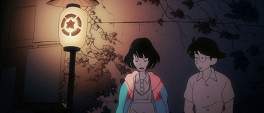
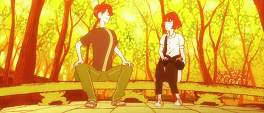
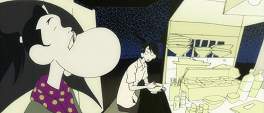
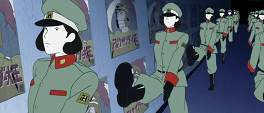
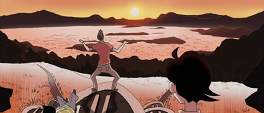
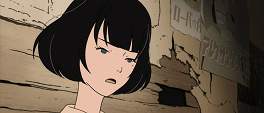
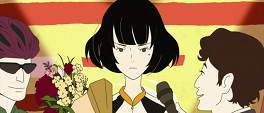
As an aside, I love the phrase "artpunch", says all it needs to despite being a neologism.